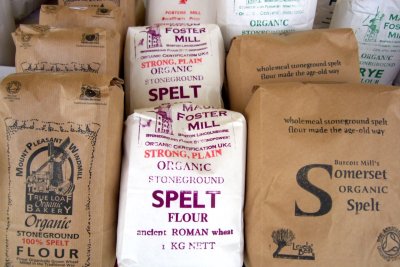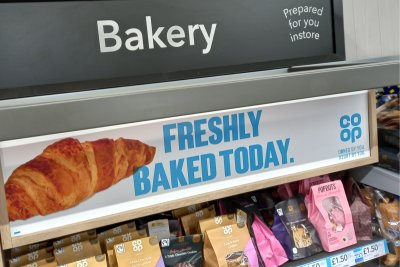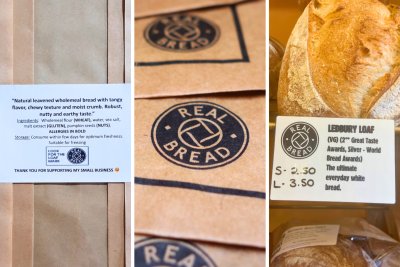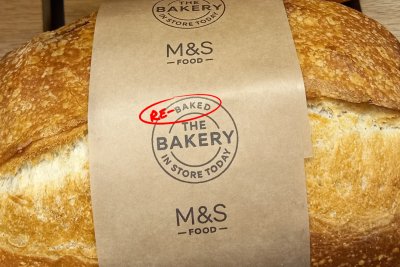 Freshly baked is a term without legal definition. Credit: Chris Young / www.realbreadcampaign.org CC-BY-SA-4.0
Freshly baked is a term without legal definition. Credit: Chris Young / www.realbreadcampaign.org CC-BY-SA-4.0
These follow the open letter of 18 March 2022 from the Real Bread Campaign, asking if the Food Standards Agency will support the Campaign's proposed Honest Crust Act; and a similar letter sent on 25 May 2022 to Food Standards Scotland.
15 July 2022
From FSS deputy CEO, Ian Watt.
Thank you for your email and for getting back in touch with Food Standards Scotland (FSS). Apologies for delayed response – combination of competing priorities and annual leave.
FSS continue to work collaboratively with policy officials across the UK and my understanding is that the various BFTWG meetings enabled policy officials to meet with a range of stakeholders to obtain views and gather information to consider alongside the overall objectives of the review of the Bread and Flour Regulations 1998.
The consultation is still being progressed and careful consideration is being given to achieving a balance between the aims of the review of the regulations and the wide range of stakeholder views expressed during the BFTWG meetings. However, once finalised and published, the consultation will provide a further opportunity for all stakeholders across the UK to comment on the policy proposals.
In due course, policy officials across the UK will consider the consultation responses and any proposals deemed appropriate that may not have been captured in the consultation itself.
As I mentioned in my email response to you on 8th June 2022, amending the legislative provisions is only one option and FSS along with the Scottish Government also support the use of non-regulatory measures such as guidance which can also help achieve understanding and best practice across the food industry.
[...]
I can however confirm that we consider that the BFTWG is the appropriate place to explore evidence and relevant proposals on a four nation basis and I understand that in due course it is possible that further meetings may take place if there is considered a need for other issues not covered in the forthcoming consultation to be discussed by the BFTWG.
[We replied: "We are disappointed that you have declined to meet with us outside of the BFTWG to discuss in detail the issues that were not given adequate time during the three meetings to date."]
6 July 2022
From the FSA Policy Manager – Food standards and food information, to the Real Bread Campaign coordinator.
As this is a devolved policy matter, I have engaged again with policy colleagues across four nations, which took some time and accounts for the delay in response.
As a collective, we continue to hold the view that the Bread and Flour Technical Working Group (BFTWG) is the right place to explore evidence and relevant proposals. The primary focus of previous BFTWG meetings had been to resolve outstanding issues relating to the Bread and Flour Regulations 1998. Colleagues in FSA, Defra, FSS and DHSC that convened or attended the BFTWG saw the engagement in Autumn/Winter 2021 as a valuable opportunity for us all to listen to a range of stakeholder views and balance these with the objectives of the bread and flour review. Developing the resultant consultation requires ongoing careful work across departments and agencies in four nations, factoring in the objectives of the review and the range of views expressed at BFTWG.
Our view is that meeting after the consultation launch, and under the BFTWG remit, will help make sure there is continuity of process and consistency for all stakeholders. We are open to further BFTWG meetings if there is deemed a need to address other issues not covered in the forthcoming consultation. It is not the case that no serious consideration would apply to proposals that are not the subject of this consultation. However, consideration of proposals at BFTWG will include an assessment of the problem and non-legislative options as part of what is an ongoing and iterative process.
21 June 2022
From Real Bread Campaign coordinator, Chris Young, to FSA CEO, Emily Miles. The same response was sent to FSS CEO, Geoff Ogle, and deputy CEO, Ian Watt.
Thank you for your response.
We are very disturbed and disappointed that none of the important issues raised by the Real Bread Campaign have been discussed adequately by the Bread and Flour Technical Working Group, and that it now seems none will be included in the forthcoming public consultation on flour/baked product composition, labelling and marketing, either.
We are concerned that no serious consideration will be given after the consultation to any issues not contained in it. If these issues are given any consideration later, excluding them from the consultation will exclude from the review process the knowledge and views of people to whom they are most relevant. Lack of this insight from shoppers and small business owners will have a great negative impact on the range and quality of information and opinion upon which civil servants and ministers then make their decisions.
As such, we would value a conversation with the FSA before the parameters and questions of this, and other relevant public consultations, are fixed, to get a better understanding of your position and reasoning on these issues and so that we can explain ours more fully. As you suggest, the Bread and Flour Technical Working Group does indeed seem an appropriate forum but, as you also note, the next one will not be until after the consultation.
What date(s) before the content of the consultations are fixed would work for you?
10 June 2022
From the FSA to the Real Bread Campaign
Thank you for signposting further evidence. The FSA has no plans to commission specific research on sourdough or the benefit of fermentation on health outcomes. We will continue to consider evidence as it evolves alongside Defra, the DHSC, FSS, Welsh Government and DoH in NI.
Labelling and nutrition are devolved policies and we want to ensure a common approach across four nations. We have spoken to colleagues in Defra, DHSC and FSS. We agree on the need to approach assessment of evidence together, to ensure a co-ordinated UK position on food compositional standards and labelling policy and facilitate clear and consistent messaging for consumers, enforcement authorities and industry. The Bread and Flour Technical Working Group (BFTWG) remains the principle forum to explore proposals with you, other stakeholders and policy officials across four nations. Amending legislative provisions is only one option and BFTWG will also consider whether non-regulatory measures such as guidance would be more appropriate.
We think meeting together under the BFTWG is preferable. The current priority for officials working on the BFTWG is the Bread and Flour Review. Input and responses to the consultation will be considered on a four-nation basis and inform amendments to the Bread and Four Regulations. Once the four-nation consultation has been developed, agreed and shared, the BFTWG will convene and can explore the next steps for proposals not captured by the consultation.
8 June 2022
From FSS deputy CEO, Ian Watt.
Thank you for your email of 25th May 2022 and for the information on the Real Bread Campaign.
We very much appreciate you bringing your campaign to our attention and taking this time to write to us.
As the public sector food body for Scotland, Food Standards Scotland recognises the importance of ensuring responsible food businesses thrive and that all consumers have access to the information they need to help make informed choices when shopping for food. We also recognise the diverse interests of our stakeholders and consumers.
As you may be aware, FSS are currently working collaboratively with policy officials in Defra, the Food Standards Agency (FSA) in Northern Ireland and Wales, DHSC, and the Scottish and Welsh Governments to undertake a UK wide review of The Bread and Flour Regulations 1998 and The Bread and Flour (Northern Ireland) Regulations 1998.
The Bread and Flour Technical Working Group, as you mention, was convened by Defra as part of this UK wide review to explore the issues around the Bread and Flour Regulations. This included scope for discussion on the compositional requirements for bread and flour and providing definitions in respect of the terms you reference in any potential legislative changes that would be beneficial to protect consumers. However, although this is still being considered, amending the legislative provisions is only one option and FSS along the Scottish Government also support the use of non-regulatory measures such as guidance which can also help achieve understanding and best practice across the food industry.
As you may also be aware, the majority of food law applying in Scotland and across Great Britain (GB) including the Food Information to Consumers Regulation 1169/2011, stems from European Union legislation and after an extensive process to ensure that it remains operational after the UK’s departure from the EU, the detail of the requirements remains in place. The existing food labelling rules along with other legislative provisions on the control of safe food production and the regulated use of food additives across GB ensures that food is produced safely and is also labelled to help enable consumers to make informed purchasing decisions in respect of the food they buy.
However, in due course, the food labelling legislation will also be subject to review and we are currently developing our thinking in this respect across the four nations. During the review process consideration will be given to which areas and policy approaches are appropriate for Scotland and in a GB context which will also include England and Wales.
Standard practice is for Food Standards Scotland to consult on changes to domestic and retained EU food and feed law and, more generally, on any policy proposal that impacts on stakeholders. The intention is to consult on a UK basis in respect of the Bread and Flour Review and the expectation is that this consultation will be published in Aug/Sept 2022. We would appreciate your participation in this process and if you are not already registered as a stakeholder with FSS, please let me know.
18 May 2022
From Real Bread Campaign coordinator, Chris Young, to FSA CEO, Emily Miles.
Thank you for your response. I really appreciate the time you’ve taken to provide this level of detail on the FSA’s position.
I have a few further questions (in italics) regarding our Honest Crust Act proposals that we would value your response on, particularly the points you make regarding FSA guidance and further evidence.
Around 1000 micro and other SME bakeries have listed their additive-free loaves on the Real Bread Map, representing just a fraction of the SMEs in this sector. They are facing ever-increasing competition from companies with enormous marketing budgets that are leaving or leading shoppers to understand that the nature, identity, properties, composition, place of provenance and method of production are other than they are. Existing legislation is not adequate for the current market or to meet shoppers’ rights and other needs.
The need for legal definitions
With apologies for potentially re-stating what you know already, at present, a product can be:
- Made with highly-refined flour as the main ingredient, with a very small percentage of wholemeal flour, and yet marketed under the healthy halo of ‘wholegrain’.
- Made, baked, frozen, transported a great distance (even from another country), then baked for a second time, and yet marketed as ‘freshly baked’, ‘baked in store’ or similar.
- Made using additives, with little to no live sourdough starter culture, and leavened using baker’s yeast or baking powder, and yet marketed as ‘sourdough bread’.
- Made in large quantities in a factory, using a computer-controlled, highly-mechanised process, using additives that no true artisan baker would use, and yet be marketed as ‘artisan bread’.
- Made with highly-refined, modern wheat flour as the main ingredient, with a very small percentage of another grain, and yet marketed using terms such as ‘heritage wheat’ or ‘ancient grains’.
None of these terms has a legal definition, giving companies more or less unfettered ability to use them prominently in product names, front of pack descriptions and other marketing designed to steer shoppers into make buying decisions. The Food Information to Consumers Regulation is not being used to prevent this. The Advertising Standards Authority has rejected a number of complaints made by the Real Bread Campaign since 2009 about what we believe to be misleading use of such marketing terms, typically citing the lack of a legal definition as a key factor in their decision.
Claims of freshness and place of production being used (notably by multiple retailers) to market products that were made elsewhere and merely re-baked in store can undermine the market for genuinely fresh bread from a nearby SME bakery. The latter supports highly-skilled and more jobs per loaf for people from that local community and helps to keep more money circulating in it. There is also a negative environmental impact of re-baking, which uses around twice as much energy as baking a loaf once, and results in products that tend to stale very quickly, increases the likelihood of those products being wasted.
The need for full ingredient labelling
While a shopper should not have to turn to an ingredients list to verify what is claimed or implied by the use of terms such as those listed above, full ingredient labelling is still essential for whatever reason that person needs or wants this information.
A baked product can be made using any number and type of ingredient and food additive, yet if the product is sold unwrapped, it is not mandatory for the retailer to declare all of these on labelling or point of sale display. It has been suggested that retailers could provide this information by other means - verbally or by digital media, for example. This argument, however, is undermined by the facts that not every shopper owns a smartphone, or has the time to wait in the hope that a member of staff will return with the requested ingredients list. As food allergen requirements clearly demonstrate, declaration of ingredients and additives at point of sale is possible.
In the case of so-called processing aids, current regulation allows manufacturers to hide the use of these additives-by-another-name from buyers of even prepacked food. This is despite the possibility (as is permitted by current regulation) that their residues or by-products might remain in the finished product.
I hope that I have been able to clearly demonstrate that improved regulatory intervention is necessary to help shoppers make better-informed choices (for whatever reason they want or need to) and to help consumer protection bodies prevent them from being misled.
If you feel that there are still gaps in the case for updated regulation, we’d really appreciate your help in understanding what is missing that would persuade the FSA of this need.
Evidence and scale of impact
You stated that “for the FSA to take forward or support regulatory intervention, the action must be necessary, proportionate and protect the interests of a wide cross-section of consumers. In our view, there is not yet sufficient weight of evidence that the proposals you outline meet those tests.”
According to industry statistics, something like 99.8% of UK households buy products marketed as bread and around 12 million loaves are sold each day. The figures indicate that perhaps 17% of these loaves (ie more than 2 million every day) are bought from in-store bakery sections, which typically use claims of freshness and/or place of production.
In January 2017, the YouGov Everyday Health Tracker found that 75% of more than 2000 respondents believe the term ‘wholegrain’ to be a healthy food claim.
A large body of evidence around the potential benefits of sourdough fermentation is summarised in Thirty years of knowledge on sourdough fermentation: A systematic review. This is based on an examination of 1230 peer reviewed research articles published between 1990 and 2020.
For the FSA to take action on the way that baked products are labelled and marketed, how much wider does the cross section of the population affected by these issues need to be?
Is the evidence noted about sufficient to persuade the FSA to consider taking the lead in carrying out, commissioning, or at least supporting, further research into the various potential health and nutritional benefits of sourdough fermentation?
If not, what further type and quantity of evidence do you require?
Guidance and regulation
We recognise the value of FSA guidance in helping consumer protection bodies to prevent shoppers from being misled. An example was Pret a Manger being banned by the Advertising Standards Authority and the trading standards department of the company’s Primary Authority from using the word ‘natural’ to market sandwiches and other food made using a range of additives.
This case, however, also demonstrates one of our concerns about non-binding guidance. From our initial complaint, it took around a year and a half for the decision to be made. We believe that the issue would have been resolved more quickly (and perhaps not even arisen) had a simple and unambiguous, legal definition been in place.
More directly related to our Honest Crust Act proposals, despite existing FSA guidance, 'freshly baked', 'baked in store' and similar claims are still commonly made to market loaves that have been re-baked (rather than made fresh from scratch) in store. Clearly, the industry is not adequately self-regulating on this issue, and evidently consumer protection bodies are not preventing the practice from being widespread.
We would, therefore, welcome FSA creating guidance in addition (and perhaps as a precursor) to our proposed legal definitions and mandatory ingredient listing, rather than instead of these.
We are wary, however, of the suggestion of industry self-regulation for the reasons we outlined in our response to a proposed code of practice sent to Defra in 2019.
I look forward to your answers to each of the questions above and to discussing how the FSA and the Real Bread Campaign might work together on these issues. We would welcome a meeting (in London or via video call) to start exploring this.
28 April 2022
From FSA CEO, Emily Miles, to Real Bread Campaign coordinator, Chris Young.
Thank you for your email and interest in the FSA’s new Strategy. I appreciate you taking the time to share evidence and proposals and I’d like to apologise for the delay in responding to you.
The FSA is an independent, non-Ministerial department working to protect public health and consumers' wider interests in relation to food in England, Wales and Northern Ireland. Working impartially, we use the available science and evidence to help understand whether regulatory intervention is necessary and appropriate.
Common Frameworks for Food Compositional Standards and Labelling (FCSL) and Nutrition Labelling Compositional Standards (NLCS) have been established to ensure a joined-up view across the four-nations and enable officials to jointly determine whether and what intervention is necessary and proportionate. The FSA is responsible for FCSL policy in Northern Ireland and Wales, and NLCS policy in Northern Ireland only.
While the FSA’s policy responsibilities vary across the UK, we work closely with the Devolved Administrations and DEFRA to protect consumers across all four nations. As you are aware, FSA officials, alongside DEFRA, and Food Standards Scotland are undertaking a review of the Bread and Flour Regulations across the UK under the FCSL Framework.
The Bread and Flour Technical Working Group you referred to was established, in part, to shape the scope of the review, taking account of the issues raised by the Real Bread Campaign and a range of other stakeholders. I understand that proposals to add specific legal definitions for sourdough, artisan, craft, ancient, heritage, fresh, and freshly baked breads were considered but did not end up within the scope of the review. I hope you will
continue to contribute to the Technical Working Group and have your say in the consultation that will take place later this year.
I’m aware that you have contacted DEFRA, who lead on FCSL policy in England, and they have not been persuaded of the case for further intervention on these specific matters. For the FSA to take forward or support regulatory intervention, the action must be necessary, proportionate and protect the interests of a wide cross-section of consumers. In our view, there is not yet sufficient weight of evidence that the proposals you outline meet those tests. However, DEFRA will continue discussions on the use of the term ‘sourdough’. The FSA is always open to assessing new evidence and will be part of those discussions with DEFRA and the other responsible departments and agencies across all four nations.
The sufficiency of the existing regulatory framework and the options for non-legislative approaches both inform our thinking when considering the case for intervention. There are regulations in place that provide broad protection in the areas in which you propose further, specific, legislation. Regulation No. 1169/2011, the Food Information to Consumers (FIC) Regulation, provides the basis for the assurance of a high level of consumer protection in relation to all food information. Information provided with food, whether in words, pictures or symbols, must not be misleading to consumers. The FIC Regulation is broad in its application and works alongside other rules, such as the requirements on the control and use of additives, health and nutrition claims and the addition vitamins and minerals to foods.
On your point about the health and nutritional benefits of grains, such claims must be based on scientific evidence and may only be used in if they have been authorised if the claims fall under Regulation (EC) No. 1924/2006.
While enforcement of standards and labelling legislation, including the use of misleading terms, is usually carried out by Local Authorities and District Councils, the FSA has a role in providing guidance. We will consider whether refreshed FSA guidance is needed or whether a new Industry Code of Practice is more appropriate once the review of the Bread and Flour Regulations is complete.
Please contact my office if you have any further questions.
See also
Real Bread Campaign: The Real Bread Campaign finds and shares ways to make bread better for us, better for our communities and better for the planet. Whether your interest is local food, community-focussed small enterprises, honest labelling, therapeutic baking, or simply tasty toast, everyone is invited to become a Campaign supporter.
Sustain
The Green House
244-254 Cambridge Heath Road
London E2 9DA
020 3559 6777
sustain@sustainweb.org
Sustain advocates food and agriculture policies and practices that enhance the health and welfare of people and animals, improve the working and living environment, promote equity and enrich society and culture.
© Sustain 2024
Registered charity (no. 1018643)
Data privacy & cookies








